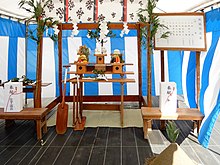Jichinsai
This article, Jichinsai, has recently been created via the Articles for creation process. Please check to see if the reviewer has accidentally left this template after accepting the draft and take appropriate action as necessary.
Reviewer tools: Inform author |

Jichinsai is a Shinto ritual in Japan. It happens before construction starts on a new building.[1][a] The festival asks for permission from the landlord deity to use the land for building.[2] It is a way to pray for safety during the construction. The contractor, who makes the building, pays for the festival. This includes the omiki and tamagushi offerings. The owner and other people involved help pay, too.[3]
In the Jichinsai festival, held before construction begins, a Shinto priest blesses the land and obtains permission from the guardian deity of the land.[2]
People set up a Himorogi at the space in order to do the ceremony[4]
The ceremony is held in the presence of builders, designers, and clients. A wooden platform is set up, and in the center is an altar on which offerings such as rice, sake, fish, vegetables, salt, and water are placed. In some cases, sand or salt from the beach near Ise Grand Shrine may be used.[1] Five-colored silk banners, called masakaki, are used in the ritual
Tsu Jichinsai Lawsuit
The Tsu Jichinsai lawsuit in 1971 declared the rite secular[5].
See Also
Notelist
- ^ Except for Ise Grand Shrine where it occurs after[1]
References
- ^ a b c https://archive.ph/wip/iQpZA
- ^ a b Adriana (2017-12-12). "Before you build: Groundbreaking ceremonies in Japan". REthink Tokyo - Real Estate Information for Buyers and Investors. Retrieved 2023-05-03.
- ^ Covingtonandsons (30 May 2021). "Supernatural Stuff". Covington & Sons Tools. Retrieved 2023-04-18.
- ^ "Ji Chin Sai - Ground breaking Ceremony". www.shinto.nl. Retrieved 2023-05-03.
- ^ "Details of 1971 (Gyo-Tsu) 69 | Judgments of the Supreme Court". www.courts.go.jp. Retrieved 2023-05-03.

